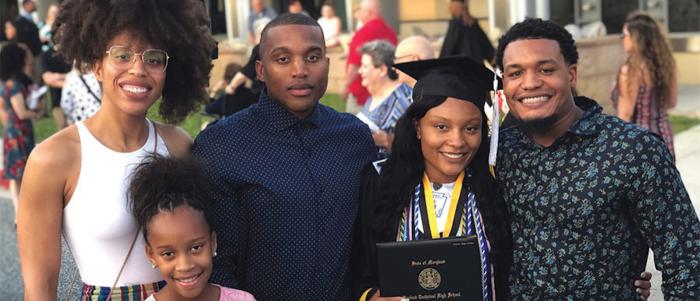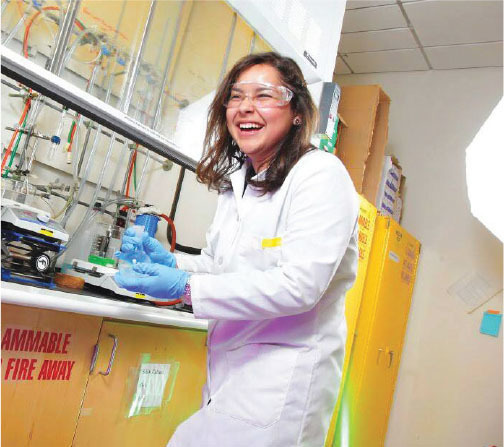
First in family: Finding success as a first-generation student
By Olivia Hall
When Armando Olivera ’72 arrived at Cornell in 1968, he brought with him a solid public education, his family’s fervent support—and little idea what to expect. While his Cuban refugee parents worked hard and struggled financially to pave the way for his success, the high school graduates had no firsthand knowledge of college to share with him. "The environment at Cornell was unlike anything that I had ever experienced before and created some real challenges," he said.
Olivera drew on guidance from his professors and dean to navigate his path to a degree in electrical engineering. He went on to a long, successful career that includes acquiring an MBA from the University of Miami and retiring as president and chief executive officer of Florida Power and Light after 40 years with the company. "As trite as it may sound, I have been able to live the American dream in no small part because of my having gone to Cornell," he said.
Every year, some 10 percent of undergraduate and 15 percent of graduate incoming engineering students self-identify as "first-generation"—those who have no immediate family that has attended college. As they follow in Olivera’s footsteps, hoping to forge their own path to academic and career success, they frequently face similar challenges: While parents and communities buoy their children with enthusiasm and any resources they can muster, they may not always have the background to prepare them for the ins and outs of college choice, applications, financial aid, and how to survive and thrive once they arrive on campus.
"The kids who have grown up with family going to college, they arrive hitting the ground running: they know about office hours, they know how to study," said Alicia Cintora, a fifthyear materials science and engineering Ph.D. student who grew up in the Little Village neighborhood of Chicago as the daughter of a landscaper and a stay-at-home mom from rural Mexico. "However, as a first-generation student, you learn a lot of those things in your first semester, and it can take a longer time to adjust and navigate these institutions which you’re the first in your circle to explore." Even attending one of the best high schools in the state and participating in a college prep program at the University of Illinois could not fill in all the gaps: "When I was a freshman at the University of Illinois at Urbana-Champaign, I had no idea that graduate school even existed," Cintora said.

When Tyler Fisher ’20 first arrived at Cornell from Port Charlotte, Florida, he felt unprepared after navigating his highschool education without the foresight of what comes next. "I went through the entire college application process on my own because no one in my family had ever applied to college or taken tests like the ACT or SAT, and they also didn’t really have any insight into what classes I would need to be successful in college," said Fisher, who is studying earth systems engineering with a concentration in planetary science.
Put differently, first-generation students lack the social capital a college-educated family bestows, and they may not always be aware of what they don’t know. Emmanuel Giannelis, Walter R. Read Professor of Engineering in the Department of Materials Science and Engineering, never felt disadvantaged at the University of Athens in his native Greece or at Michigan State University, where he earned his Ph.D. in chemistry. "Later on I realized, though, that people who grew up with more opportunities were more mature and more sophisticated simply because of the environments that they grew in," said Giannelis, who also serves as the Vice Provost for Research and Vice President for Technology Transfer, Intellectual Property and Research Policy. "It is only recently that I became aware of the term ‘first-generation students’ and the importance that we place in them, including recognizing that they might have different needs than the average student."
At Cornell, a number of resources have grown over the past four decades to meet these needs. At Cornell Engineering, the Office of Diversity Programs in Engineering (DPE) provides support services, leadership opportunities, professional development, and research openings for undergraduate and graduate students from groups historically underrepresented in engineering, including first-generation students, women, ethnic minorities, individuals with other orientations and veterans.
Emails go out to students who self-identify as first-generation to direct them to such opportunities as special events, fellowships and the Cornell University Engineering Success (CUES) Program, whose offers include enhanced tutoring and an eight-week summer math institute for rising sophomores and juniors. DPE also helps incoming engineering students from underrepresented populations get acclimated to campus and academics as part of the Prefreshman Summer Program and provides peer-to-peer mentoring from upperclassmen through CU EMPower. Collaborations with such campus-wide programs as the Office of Academic Diversity Initiatives and the Dean of Students’ Office of First-Generation and Low-Income Student Support further strengthen support for first-generation students, staff and faculty.

"The goal is to create a holistic system increasing students’ cultural and social capital to understand the university experience, what to expect, how it works," said Jami P. Joyner, DPE’s director. "It’s beneficial to be able to see career trajectories for themselves and that ‘first-generation’ comes in many shapes and forms." And with different needs. First-generation graduate students, for instance, may not have received the same level of support across different undergraduate institutions, and even if they have finally mastered the nuances of undergraduate education, master’s or doctoral programs pose new challenges. "We discuss how to have conversations from an empowered perspective with your faculty advisor," Joyner offered as an example.
As students from all walks of life thrive, she hopes, so will the university. "When you have people from various backgrounds, you’re enriching the institution, because you’re bringing in a diversity of thought and experience that aids solution finding and advancement," Joyner explained. During his past tenure as chair of the student life committee of Cornell’s Board of Trustees, Olivera regularly advised first-generation and minority students to take advantage of this rich environment. "The technical part of my engineering degree was obsolete within a few years after graduation but what I learned from my professors and fellow students about solving problems and dealing with people has helped me throughout my life," he said.
On the other hand, first-generation students frequently seek understanding and comfort among friends similar to themselves. For Korie Grayson, a sixth-year Ph.D. student in the Meinig School of Biomedical Engineering, Norfolk State University (NSU), a Historically Black College and University, was a good choice. "Most of us were first-gen college students, and we took that journey on together by helping each other and growing together," she said. For Cintora, participating and assuming leadership positions in her college’s chapter of the Society of Hispanic Professionals in Engineering filled a similar need. At Cornell, both have turned to DPE for this type of support. Fisher, a member of Cornell’s cross country team, was able lean on his coach and teammates.

If the mentorship of peers and elders is important in helping first-generation students graduate from academic institutions, it may be even more vital in getting them there in the first place. Take Grayson, for example. While her parents—both in the U.S. Army—set the expectation that their five children should pursue higher education, it was a series of mentors that guided her through its practical implementation. "I had a high school counselor, Tiffany Walker, who influenced me heavily on my path to attend college," Grayson recalled. "Her strategy worked. I got into all 15 schools I applied for and had over $400,000 in scholarships." Grayson chose NSU, not least for its full-ride scholarship program that promotes minorities in sciences and offered the mentorship of its director Aliecia McClain—"the first black woman I’ve ever met who had a Ph.D."—and a number of other scholars who encouraged her to pursue a graduate degree.
Michael-Paul Robinson, who received his Ph.D. in chemical and biomolecular engineering in 2017, echoed her story, affirming the power of seeing people like yourself succeed. "Where we’re from, you only think about two ways to pull yourself up, and that’s either education or athletics," he recounted on Science Blender, a student-produced podcast profiling Cornell engineers. Robinson’s family insisted it be education. But it wasn’t until Robert Edwards, his professor of chemical engineering at Case Western Reserve University, told him he should go to graduate school that he seriously considered that pathway. "I really admired him, because he was the only African American science professor I had," Robinson said. "To have someone like that have complete and full confidence in you—it was something that I didn’t have in myself."
This boost of confidence and accomplishment came at a price. "It’s an extra burden you put on yourself, continually trying to prove that you merit it and to not fail the people back home who are looking up to you," Robinson said. But he and other first-generation students frequently expressed gratitude for the opportunities in their lives, including being able to become the kind of role model that first inspired them and to lift up their own families and communities in turn. "The best outcome of all my struggles is that I have small cousins that have grown up with me while I have gone through these experiences and they see themselves going to college because of me," Cintora said.

If Olivera’s example is any indication, they will be drawing on these lessons and inspiring others for a lifetime. "Be it the scholarship which allowed me to attend college or all the mentors that I came across during my education and later on in my professional career—I never did or have since taken for granted all that has been given to me," he said.

